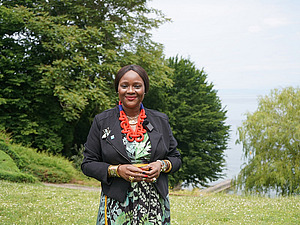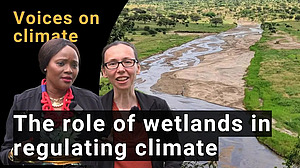"Wetlands play a key role in agriculture and regulating our climate"
Voices on climate – this time with video
Since 2022, Musonda Mumba has served as the Secretary General of the (Ramsar) Convention on Wetlands. Born in Zambia near the lake systems of Bangweulu and Mweru as well as the river Luapula, her career path has been closely linked to wetlands as essential ecosystems. She holds a PhD in Wetland Hydrology and Conservation from University College London (UCL) and brings over 25 years of international experience in environmental management and sustainable development.
Wetlands are complex ecosystems that sustain the livelihoods of many communities around the world. They are intricately intertwined with agriculture and the provision of food and play a key role in regulating our climate. Without wetlands or water, there is no agriculture—and eventually, no human survival. Climate change is already affecting water availability, threatening the delicate connection between climate, water, food, and livelihoods
The UN Decade on Ecosystem Restoration is addressing the degradation of ecosystems, including wetlands, to tackle the challenges of climate change, biodiversity loss, and the decline of healthy soils. It is not only about planting trees but about rethinking how we grow food in more sustainable and diverse ways in the future. Agroecological and organic approaches maintain diversity in agricultural systems and use water resources efficiently, making them an important part of the wetland restoration agenda.
Successful example for ecosystem restoration
The city of Kigali, Rwanda, is an example of the importance of restoring the functioning interaction of farming, food systems, and wetlands in a changing climate. In 2018, President Paul Kagame introduced a policy to restore the city's wetland system to address the poor water quality for farmers downstream. The wetland's filtration mechanism vastly improved the quality of the river—birds that had not been seen in 25 years returned and the refuge for natural pollinators was restored. During the 14th Conference of the Contracting Parties to the Convention on Wetlands in 2022, it accredited Kigali as an official Wetland City, recognizing its outstanding efforts in safeguarding its urban wetlands.
Climate change as an international challenge
The catastrophe seen on May 28th in Switzerland, when the Birch Glacier wiped out the village of Blatten, reminds us that climate change is not only affecting developing countries, but all regions of the world. The upcoming COP30 of the UN Climate Change Conference in Belém, Brazil, is a watershed moment for the world. Stakeholders must talk about the power of the collective and about how to integrate nature conservation when talking about a 1.5-degree world. In this, wetlands can play an important role as nature-based solutions.
The role of science and knowledge exchange
Science – including both traditional knowledge systems and state of the art science – is extremely critical in global conversations around climate. We need scientists from every region and discipline, as well as communities and policymakers, to explore together what will work in a warmer world. In fact, research is evolving rapidly, but it is not always shared across sectors, and many cannot afford new technologies. We should foster learning from South to South, South to North, and back again, to have a global community of practice. In the end, agriculture that is good for nature and climate is also good for humans. I believe that by coming together, we can meet the 1.5-degree target for the sake of everyone on this planet.





